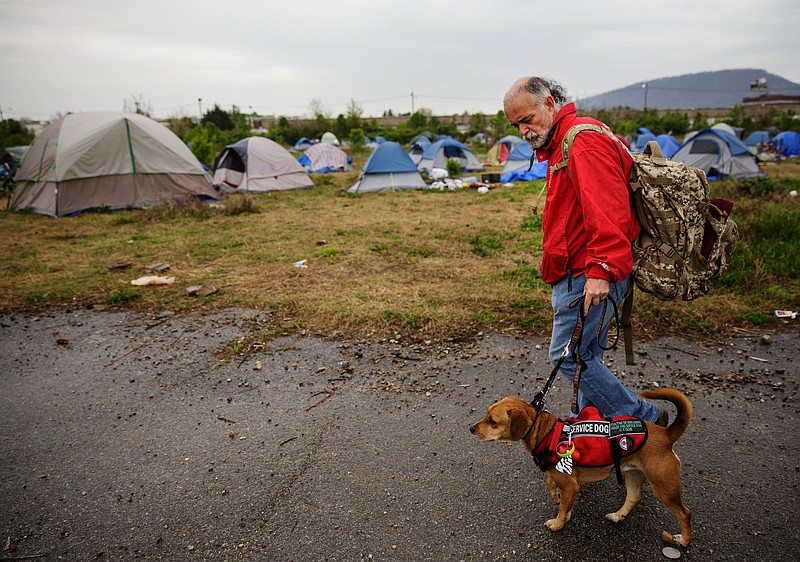Here we go again. The homeless encampment off East 11th Street along the railroad tracks is in the crosshairs of the city and Norfolk Southern Railroad once more. It's pretty much a yearly occurrence over the past decade.
And we understand it, somewhat. After all, people - whether walking, camping or sleeping - and trains are a precarious mix.
This time moving the encampment, which is on railroad property, will displace about 150 people, according to city officials who are working with the railroad and a number of homelessness organizations.
The hope is not merely to "displace" the homeless but to place them - to find housing or "sanctioned" and "supervised" camping for them nearby - all between now and May 31.
Sure. We've heard some iterations of all this before. And often with varying results. Housing homeless people sounds much easier than it is in reality.
But we're hearing a lot more of it lately, no thanks to the pandemic that disrupted jobs and living arrangements. Simultaneously, we've watched a mind-boggling rise in all housing costs, especially in Chattanooga. Affordable housing is not just a new buzzword of the day. It's a growing crisis that we haven't yet been able to get our arms around.
But give credit where credit is due: Mayor Tim Kelly seems pretty good so far at recruiting partners - even partners who have traditionally been obstacles, like a railroad that in the past simply bulldozed tent cities or insisted city police roust the squatters. Kelly also recently cajoled a group of rental property owners into allowing the city to provide something of an insurance policy for folks with evictions or longtime homelessness on their records - things that make giving them an apartment key seem just too risky in the eyes of a landlord.
In announcing the latest tent city transformation, Kelly lavished praise, not shame.
"I'm proud of our service providers and community partners who are working diligently and alongside our team to ensure residents of the property are quickly housed," he said Wednesday in a statement. "I am also grateful to Norfolk Southern for committing resources for relief and rehousing efforts and for being flexible on a timeline to allow the city to come into compliance with safety requirements on their property."
Kelly also seems to recognize the importance of timing.
The very next day - Thursday - the mayor announced the city will allocate $33 million from its 2023 budget to jumpstart what he expects to become a $100 million investment over the next five years to create and preserve thousands of local affordable homes.
It will be the largest such effort in city history and will involve private and federal partners - including money to the city from the Bipartisan Infrastructure Legislation and the American Rescue Plan Act made possible by the Biden administration.
"The initiative, which is 20 times larger than a previous city effort, will bring together local philanthropy, nonprofits, local banks and credit unions, and housing providers to begin filling an estimated housing gap of more than 5,000 homes across Chattanooga," according to a city statement about the plan. "The first projects are expected to receive funding before the end of 2022. ... There will be no tax increase to pay for the plan."
It's time for this. Actually past time. Tent cities are just the most visible pain caused by our lack of affordable housing. And just the tip of a looming iceberg.
Median housing prices in Chattanooga have increased more than 80% since 2015, leaving 43% of renters defined as "housing burdened," spending more than 30% of their income on housing. Among them, 22% are "housing insecure," meaning they spend more than half of their income on housing, putting them at risk of eviction or foreclosure.
"We stand the very real risk of becoming a city where lifelong Chattanoogans cannot afford to live, and that is flatly unacceptable," Kelly said in the statement.
Unlike many "redevelopment" and "development" plans before it, this one is not all about attracting out-of-Chattanooga dollars for high-end homes intended to return big dollars to distant investors. It's designed instead to multiply local dollars - beginning with local renters and homeowners and stretching to extend tax dollars.
"Once activated, funds will flow into site acquisition, public-private partnerships, gap financing, down-payment assistance, and owner-occupied rehabilitation," according to Kelly's statement. He said the inspiration came from similar successful projects in Renton, Washington; San Antonio, Texas; Raleigh, North Carolina and Charlotte, North Carolina.
These are good ideas and worthy efforts.
And while today's aspirations can't materialize fast enough for the 150 folks in tents along the railroad track off East 11th Street, the interim "partnerships" and plans have promise.
Here's hoping. And watching.
